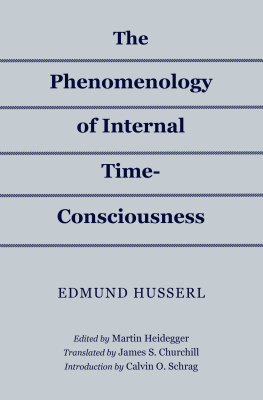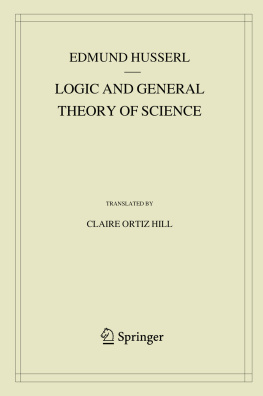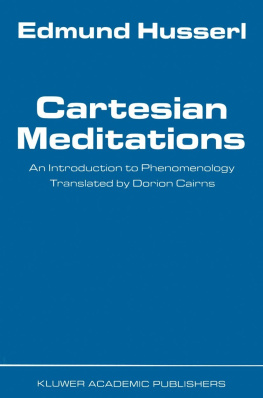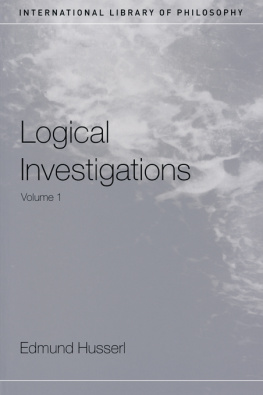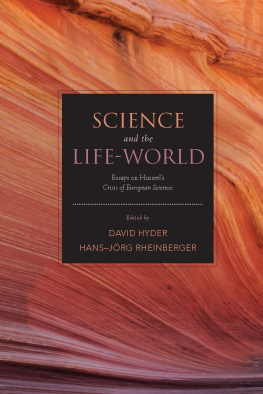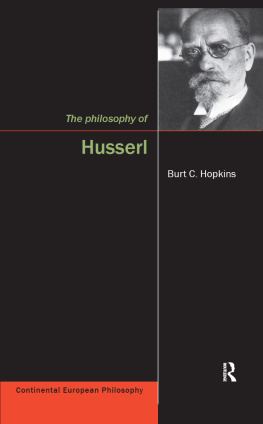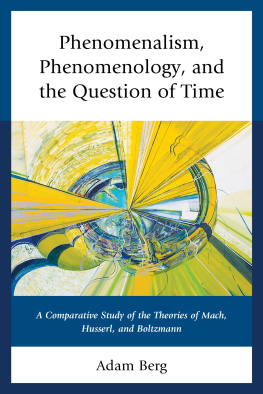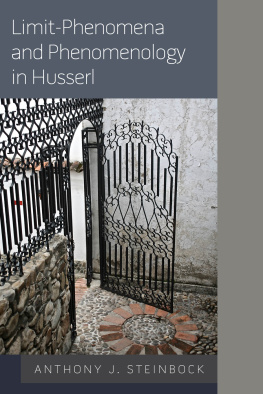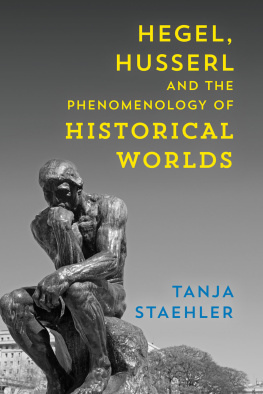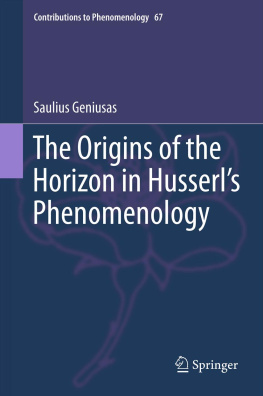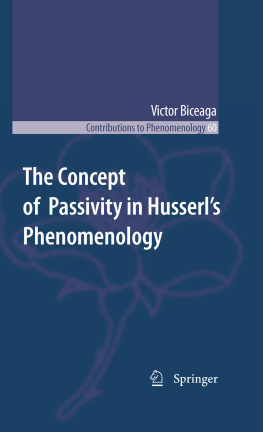Edmund Husserl - The Phenomenology of Internal Time-Consciousness
Here you can read online Edmund Husserl - The Phenomenology of Internal Time-Consciousness full text of the book (entire story) in english for free. Download pdf and epub, get meaning, cover and reviews about this ebook. year: 2019, publisher: Indiana University Press, genre: Science. Description of the work, (preface) as well as reviews are available. Best literature library LitArk.com created for fans of good reading and offers a wide selection of genres:
Romance novel
Science fiction
Adventure
Detective
Science
History
Home and family
Prose
Art
Politics
Computer
Non-fiction
Religion
Business
Children
Humor
Choose a favorite category and find really read worthwhile books. Enjoy immersion in the world of imagination, feel the emotions of the characters or learn something new for yourself, make an fascinating discovery.
- Book:The Phenomenology of Internal Time-Consciousness
- Author:
- Publisher:Indiana University Press
- Genre:
- Year:2019
- Rating:5 / 5
- Favourites:Add to favourites
- Your mark:
- 100
- 1
- 2
- 3
- 4
- 5
The Phenomenology of Internal Time-Consciousness: summary, description and annotation
We offer to read an annotation, description, summary or preface (depends on what the author of the book "The Phenomenology of Internal Time-Consciousness" wrote himself). If you haven't found the necessary information about the book — write in the comments, we will try to find it.
The Phenomenology of Internal Time-Consciousness — read online for free the complete book (whole text) full work
Below is the text of the book, divided by pages. System saving the place of the last page read, allows you to conveniently read the book "The Phenomenology of Internal Time-Consciousness" online for free, without having to search again every time where you left off. Put a bookmark, and you can go to the page where you finished reading at any time.
Font size:
Interval:
Bookmark:

The Phenomenology of Internal Time-Consciousness
EDMUND HUSSERL
The Phenomenology of Internal Time-Consciousness
EDITED BY MARTIN HEIDEGGER
TRANSLATED BY JAMES S. CHURCHILL
INTRODUCTION BY CALVIN O. SCHRAG
INDIANA UNIVERSITY PRESS
This book is a publication of
Indiana University Press
Office of Scholarly Publishing
Herman B Wells Library 350
1320 East 10th Street
Bloomington, Indiana 47405 USA
iupress.indiana.edu
Second printing 2019
1964 by Indiana University Press
All rights reserved
No part of this book may be reproduced or utilized in any form or by any means, electronic or mechanical, including photocopying and recording, or by any information storage and retrieval system, without permission in writing from the publisher. The paper used in this publication meets the minimum requirements of the American National Standard for Information SciencesPermanence of Paper for Printed Library Materials, ANSI Z39.48-1992.
Manufactured in the United States of America
Cataloging information is available from the Library of Congress.
Originally cataloged as LCCN 64010829; ISBN 0-253-200970
ISBN 978-0-253-04196-8 (paperback)
ISBN 978-0-253-04199-9 (web PDF)
2 3 4 5 624 23 22 21 20 19
CONTENTS
Part One
The Lectures on Internal Time-Consciousness from the Year 1905
Part Two
Addenda and Supplements to the Analysis of Time-Consciousness from the Years 1905-1910
INTRODUCTION
The present volume is a translation of Edmund Husserls Vorlesungen zur Phnomenologie des inneren Zeitbewusstseins. With this translation Professor Churchill has rendered to the English-speaking world a service of inestimable value. In the light of the resurgence of interest in the philosophy of Husserl and the development of phenomenology more generally a translation of Husserls important but often neglected lectures on the phenomenology of the internal time-consciousness is long overdue, and we owe Professor Churchill a great deal for making accessible to the English reader this particular aspect of Husserls philosophical contribution. A translation is never an easy undertaking, and the value of the services performed by the translator are often overlooked. A good translation requires both a technical knowledge of the language and a fundamental grasp of the subject matter. The present translation is commendable on both counts. It remains grammatically true to the original text and succeeds in capturing the spirit of Husserls philosophy.
Phenomenology, since the foundations of its program were laid by Husserl, has always received serious attention on the Continent. In the United States and Great Britain, however, its impact has been somewhat delayed. Although it has been the subject of discussion for some time in various isolated philosophical circles in the English-speaking world, not until recently has it made its way into the mainstream of contemporary Anglo-American thought. This is in some respects puzzling, for the phenomenological approach is not alien to American philosophical soil. William James, for whom Husserl always had a great admiration, not only dealt with phenomenological issues but did so in a way that exhibits striking parallels to the method of Husserl. James interest in the structure of human consciousness and his suggestions regarding the intentional nature of knowledge afford a link between American pragmatism and German phenomenology which merits further exploration. Currently there is some interest in investigating the parallels between phenomenology and Anglo-American linguistic philosophy. Although it is well to caution against a too easy rapprochement between these two traditions, it would appear that the meanings disclosed in the usages of ordinary language are significantly akin to those explicated by the language of the Lebenswelt. It would thus be a fair inference that the task of philosophy is envisioned by these two traditions in a not wholly dissimilar way.
One of the more distinctive characteristics of the phenomenological movement is its cultural pervasiveness. Its impact has been discernible in studies on perception, psychology, psychiatry, ethics, religion, art, and education. Husserl himself was quite aware of the relevance of his investigations to the various areas in the cultural and historical life of man. Although the primary task which he assumed was that of laying the foundations (which in a sense have to be laid anew for each generation), his writings offer fertile suggestions for phenomenological investigations in the special areas of the humanities and the social sciences. He did not have the time to carry through these investigations, but he did provide the impulse and the methodological tools for his phenomenological successors. The continuation of this impulse and the refined elaboration of these tools is discernible in such provocative works as Merleau-Pontys Phenomenology of Perception, Nicolai Hartmanns Ethics, Max Schelers The Nature of Sympathy, Rudolph Ottos The Idea of the Holy, Paul Tillichs The Courage to Be, and Alfred Schutzs The Problems of Social Realitynot to mention the direct influence of Husserls thought on Martin Heideggers Being and Time and Jean-Paul Sartres Being and Nothingness.
In the thought of Husserl, as in the thought of every great philosopher, one can trace stages of development. He deepened his investigations and matured his reflections as he moved from the University of Halle (18871901) to Gttingen (19011916) and then to Freiburg (19161929). It was during his career at Freiburg, as well as during the period following his retirement, that he assimilated his later and mature reflections with his earlier insights. It was this whole course of development that gave to the world the seminal ideas of phenomenological philosophy. Some of the main themes and ideas that emerged throughout this development were: a critique of psychologism, the intentionality of consciousness, the phenomenological and eidetic reduction, the phenomenological ego, transcendental intersubjectivity, time-consciousness, and the life-world. Husserls approach to these phenomenological issues, however, was never that of the system-builder. He abhorred system-building as much as did Kierkegaard and Nietzsche. He was always a beginner, reexamining the foundations of his investigations, resisting all fixed formulations and final conclusions. Philosophy for Husserl was a never-ending pursuit of serious and open-ended questions, which lead to further questions that may require a resetting of the original questions. This at the same time accounts for the fertility of his investigations and for the philosophical freedom which his whole philosophy illustrates.
What place does Husserls essay on the internal time-consciousness have in his over-all historical and ideational development? The first part of the essay was originally presented as the content of a lecture course at the University of Gttingen in the winter semester of 19041905. The second part is based on additional and supplementary lectures which he gave on the subject between 1905 and 1910. The period which spanned the formulation and development of the ideas contained in the present work constituted an interim between the publication of the second volume of his Logical Investigations (1901) and his Ideas: General Introduction to Pure Phenomenology (1913). Although Husserl published very little during these intervening years, this interim was a kind of ripening period for his philosophical ideas, as is evidenced by his lectures on time. The significance of these lectures did not become immediately apparent, either because of an apathetic philosophical audience or because of historical factors in the development of philosophy in Germany at the time. It was not until 1928 that the lectures were compiled and published by Husserls former student, Martin Heidegger.
Next pageFont size:
Interval:
Bookmark:
Similar books «The Phenomenology of Internal Time-Consciousness»
Look at similar books to The Phenomenology of Internal Time-Consciousness. We have selected literature similar in name and meaning in the hope of providing readers with more options to find new, interesting, not yet read works.
Discussion, reviews of the book The Phenomenology of Internal Time-Consciousness and just readers' own opinions. Leave your comments, write what you think about the work, its meaning or the main characters. Specify what exactly you liked and what you didn't like, and why you think so.

